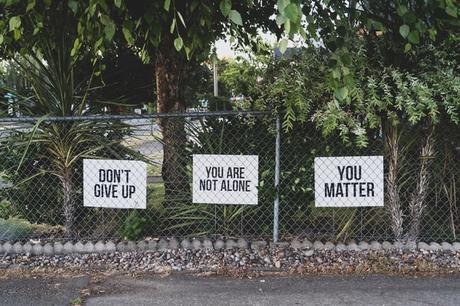
Fires. Pandemics. Mass political unrest. Economic precarity. The election crisis. 2020, anyone? It seems like this year is just one wave of crisis after another, and our mental surge capacities are dwindling the longer we weather this storm.
It's understandable that our reactions might be panic or denial. This year more than ever we are collectively bracing ourselves anxiously against the storm while shutting our eyes, holding our breaths and crossing our fingers until the crises pass-and hoping that everything will return to "normal" quickly once they do. Yet, there seems to always be another right behind it.
As one who is intimately familiar with facing multiple crises at once, I know we can all benefit from a shift on perspective and a revamped approach sometimes. I talk more about this concept in my new book Make Room for Joy. How are your crisis management skills right now? Abandoned at birth, betrayed by loved ones, treated for breast cancer-twice-then heartbroken by infertility and its losses, I have developed the ability to not just survive crisis in its myriad forms, but to thrive through it-and because of it. Rather than running from crisis, I see the value of shifting our perspective on it, turning toward it, embracing it and normalizing it by accepting that it is an important, integral part of a well-lived life.
I know this may sound counterintuitive, so let me explain. To better manage all of the stressors past, present, and future in our lives, here's a manual:
Understand that Crises Happen All the Time, and prepare accordingly
Whether on a global or regional scale or at the level of your family or yourself, life is, in many ways, like a stone path through a river - you jump from one life moment to the next sometimes avoiding the fall, but often falling into the deep murkier waters of crises. See 2020! Viruses, Injuries, layoffs, illness, breakups... It isn't a matter of whether they will happen, but when. Life contains crises and the sooner we understand that crisis is as much a part of our journeys as the more joyful times are, the better we can weather the stormy seasons.

When disasters and difficulties erupt, our anxiety increases. Instead of feeling prepared, we panic. Loss, grief, health challenges, and trials of one kind or another happen to everyone. The key to finding comfort when they do is to prepare yourself to face them rather than spend all of your energy trying to avoid them. A difficult time can tear you down, or it can build your character. It's a fight. A boxing match. It's a marathon. A long hike. The more you train and prepare for it, the more likely you are to triumph in the end.
Carry Empathy for Others and Cultivate Community
When you turn toward a crisis and allow yourself to experience it, you gain a heightened sense of just how vulnerable you are. And this is okay! Vulnerability, too, is an important part of life.
Knowing what it feels like on a personal level can also help you understand others who are experiencing it and to approach their pain with greater understanding and empathy. You'll help them experience the freedom that results from being honest about how they feel. They'll be encouraged when they see you and hear you say, "This too shall pass, but right now it's rough. And I don't like it." You'll be better able to serve people because you're not trying to cover up a problem with a little lipstick or foundation.
You show up without makeup, without a mask, and then give them permission to do the same. It is in this vulnerable place that the most beautiful parts of you and your connections are uncovered and nurtured. Couldn't we all benefit from stronger, more stable, empathetic connections right now? How much energy would we save if we decide to get in the ring with crisis together instead of trying to maneuver it around it all alone?

What would society look like if we saw gaps in employment as times of growth? Caring for ill loved ones or navigating chemotherapy is not a time of zero growth, but instead a self-reckoning that results in tremendous self-reflection and definition that ultimately helps a person come out stronger.
Take time to Find Small Pockets of Joy
No one likes suffering, but avoiding it limits our own growth and potential. We obsessively read self-help books, go to every inspirational conference, save every motivational post on social media, and buy every "find your joy" journal. We do all of these things in an attempt to prevent
or avoid the pain and suffering that might result from a difficult situation. Just as controlled burning allows for a healthier forest, so crisis lays bare the essentials for life and paves the way for growth. Being able to define exactly what you need, right now, is a huge tool of personal growth and one that crisis necessitates. No one can give you a checklist to "feel better"- only you can, and that is incredibly empowering. Taking time to smell the roses, your child's hair, or just enjoy some chocolate because it's what you *need* to get through this day is exactly what it takes to grow through a crisis. Trusting that crisis leads to growth will help you find joy in even the most troubling times.
Share. Your Community Will Hold You.
Sharing our story in a genuine manner encourages others to do the same - This exchange paves the way for connection. And connection is good for our physical health and our mental help. Genuine connection creates a freedom within relationships that makes room for uncomfortable, unfinished, messy problems to be tackled together with a level of optimism and collaboration that just feels good. We will never truly understand someone else's fear, uncertainty or pain, but we can acknowledge it, and choose to step into the moment with curiosity so that empathy can emerge. This process helps to normalize the pain, or disappointment and make room for the opportunities embedded on the problems to emerge. When connections look like this they are void of judgement and full of grace.
Sometimes, the best thing you can do is admit that everything is not okay. If you need help, ask for it. It takes courage to ask for help. Getting comfortable asking for help is part of learning to be okay with not being okay.
This guest post was authored by Vanessa Joy Walker


Ms. Career Girl was started in 2008 to help ambitious young professional women figure out who they are, what they want and how to get it.

